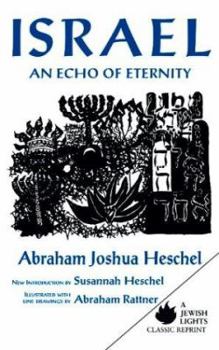Israel: An Echo of Eternity
Select Format
Select Condition 
Book Overview
Israel: An Echo of Eternity is Dr. Heschel's book about the past, present, and future home of the Jews. According to Dr. Heschel the presence of Israel has tremendous historical and religious... This description may be from another edition of this product.
Format:Paperback
Language:English
ISBN:1879045702
ISBN13:9781879045705
Release Date:January 1997
Publisher:Jewish Lights Publishing
Length:233 Pages
Weight:0.75 lbs.
Dimensions:0.8" x 5.4" x 7.9"
Related Subjects
History Israel Judaism Middle East Palestine Religion Religion & Spirituality TheologyCustomer Reviews
1 rating
context may have changed, but the lessons remain the same
Published by Thriftbooks.com User , 14 years ago
Israel: An Echo of Eternity is a remarkable text from Heschel. Although it was not what I expected, I find that it offers a very unique insight into Jewish thought, from a very specific time and place, and from a very distinguished human being. Heschel visited Israel right after the Six Day War in 1967, and what this book offers is his interpretation of "what Israel means" to the world, for both Jews and non-Jews. I expected something closer to a journal, detailing his thoughts and observations from his visit. What Heschel provides is more of an outline of Jewish philosophy, in the context for a 1967 audience. It is rare to find such an articulate encapsulation of the perceptions "the day after" such an historical event. This is not a history book. If anything, it is more like an emotional time capsule. The Israel of 1967 is very different from the Israel of the 21st Century, but the hopes and aspirations of what Israel can mean for our lives and to the future is still present throughout this book. Heschel's words are a snapshot of his own perceptions of Judaism, politics, philosophy, and the evolving State of Israel. There are two very poignant items that struck me in this book: his notion of paradox and his observations of regional politics. Early on in the book, Heschel addresses the idea of paradox as an inherent part of religion (for example, religions teach us to treat all people equally, but we are also commanded to hold special attention to our mother and father). I can only imagine the paradox that Heschel must have felt in 1967. The State of Israel only survived out of the violence inherent in war, but Heschel's own philosophy is so deeply rooted in the tenants of non-violence. In the context of discussing the regional conflicts, Heschel clearly states "We (Jews) abhorred and continue to abhor violence." The strength of the Jewish connection to Israel is driven by Hope. Heschel's words clearly state that "Hope cannot stand alone. It must be morally substantiated, faithfully attended." The words balancing "hope" and "morality" of Israel's actions had very specific meaning in 1976. The same words, however, raise different challenges today, when addressing the politics of the region in the 21st Century. Heschel also states "[peace] is our hope, our prayer, our goal. The six days of war must receive their ultimate meaning from the seventh day, which is peace." Heschel admits that "We must not expect history of politics to read like the history of theology," but he also does not shy away from the importance of the political realities that challenge Israel then and today. The book not only addresses the desire of Jews to connect with Israel, but also addresses the importance of Israel to Christians and Arabs as well. Balancing the needs of humanity is the ultimate challenge that Heschel attempts to address - "How to unite the human and the holy?" For Heschel, the Bible is still an unfinished drama, and all peop






